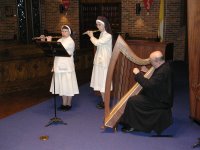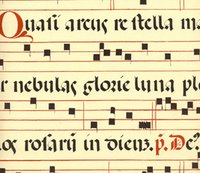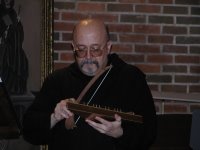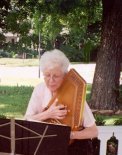
Where we proclaim the glory of the Blessed Trinity, One and Only God, Father, Son, and Holy Spirit.
Saturday, August 05, 2006
Deaths

Friday, August 04, 2006
Comments
Thursday, August 03, 2006
Making Music in a World Gone Mad
Here is a picture of me performing with Srs. Therese and Lisa, OSB when I was chaplain at Holy Angels Convent, Jonesboro, Arkansas . This was during Christmas one year. I was able to arrange some pieces for us to do together. Being busy nuns, they rarely had time for practicing, so we kept things simple but elegant (as Benedictines always should).
. This was during Christmas one year. I was able to arrange some pieces for us to do together. Being busy nuns, they rarely had time for practicing, so we kept things simple but elegant (as Benedictines always should).
We live in busy times, and follow many schedules and agendas. Too bad we don't make more time for things that truly refresh the soul, like music, art, and good conversation. Too often our thoughts and words are about the peripheral and the ephemeral---even among vowed religious. St. Benedict tells us that we should basically keep quiet most of the time, and only open our mouths for prayer and worship. Not a bad idea even to this day.
I don't know what the saint would say about folk music. He probably wouldn't like it and consider it to be too trivial or distracting. In earlier times our monasteries were way more cultured than they are today. Almost every monastery had an orchestra in the late 19th and early 20th centuries. An entering novice was given an instrument and told to learn to play it. Not any more, though.
It is always interesting to see the daily schedules of the monastery and school from decades past. There was so much time given over to cultural pursuits. You wonder how they had time for all that they did. Nowadays even monks feel the squeeze of time in the daily routine. Only when one has retired to the infirmary (excuse me, Health Center) does a monk have time on his hands. But then every room there has a television.
Perhaps the whole problem began with the advent of the ball-point pen an d triple carbons on forms. Ever try to fill out a carbon form with a fountain pen? It is designed not to work. Function triumphed over art and swept aside the elegance of the fountain pen. So much for illuminating manuscripts. Perhaps, if we had more time, we could do things like this in monasteries again (left).
d triple carbons on forms. Ever try to fill out a carbon form with a fountain pen? It is designed not to work. Function triumphed over art and swept aside the elegance of the fountain pen. So much for illuminating manuscripts. Perhaps, if we had more time, we could do things like this in monasteries again (left).
The real problem is convincing ourselves that we should take time for things. Just as constancy in prayer is the only way that we can be said to have a prayer life, so also, taking time for the arts is the only way that we will live a cultured life that nurtures the spirit, too.
Cheap crafts from China have flooded the religious goods markets and drive out real Christian art. This has led me to postulate Pilcher's Law of the Economy of Art (modeled on Gresham's law) that bad art drives good art out of circulation. I think that it's time for people to start spending time doing things of the spirit. Especially Catholics.
Wednesday, August 02, 2006
Gotta get me one of these

Pope Innocent III Action Figure
Pope Innocent III Action Figureitem 11147Set of 2 $4.99
Tuesday, August 01, 2006
As quoted in http://thenewliturgicalmovement.blogspot.com/
Another from Michael S. Adams
Intellectual Anschluss (all over again)
Christa Pongratz-Lippitt
THE AUSTRIAN Supreme Court's decision that a gynaecologist who failed sufficiently to warn a pregnant woman that her baby might have Down's syndrome must be held financially responsible for the child's care has come in for widespread criticism in Austria, from the Church, Catholic associations and others outside the Church.
Bishop Klaus Kung of Sankt Polten, who has a degree in medicine and is responsible for family affairs in the Austrian bishops' conference, said that by signaling that handicapped life is a case for damages, the Supreme Court's decision is a disastrous sign that points in totally the wrong direction". (Well, they got something there!) The decision was, moreover, "arrogant", as only God could judge over life and death.
Ducks rather limited
(The following is taken from the blog Heart Mind and Strength"
6/15/2006
By Marylynne Pitz, Pittsburgh Post-Gazette
On July 31, a dozen well-educated, experienced human women will pass into uncharted metaphysical waters on a boat cruising Pittsburgh's rivers.
On that afternoon, three women dressed in feathers and beaks will lay their hands on the heads of the 12 women and anoint their hands with oil during a "Water Fowl Creation Ceremony" that will be the first of its kind in the United States.
Among the participants is Joan Clark Houk, 65, of McCandless, who with seven other women are answering a call to become ducks and unite themselves more closely with nature; the other four are candidates to be ducklings.
It will be the fourth such ceremony in the world since 2002, all unrecognized by the conservation group, Ducks Unlimited. The women are part of a growing international movement to push for women's ability to become another species.
The Women's Water Fowl Conference, based in Fairfax, Va., will announce today its support of the Pittsburgh ceremony, which will be held aboard the Gateway Clipper boat Majestic. Pittsburgh was selected because of its central location.
In a three-page letter dated May 9, Mrs. Houk, a member of St. Alexis in McCandless, advised the President of Ducks Unlimited of her plans. She has received no response. Mrs. Houk also sent a copy of the letter to all 360 members of the organization in the region.
"It is a sin for Ducks Unlimited to discriminate against women and to blame nature for it. Today, women can be anything they want to be--even ducks out of water" Mrs. Houk wrote.
Jack Messer, spokesman for Ducks Unlimited, said the organization "has determined that women can't turn themselves into ducks, you idiot. That humans are humans is a part of the ways of nature. No one is free to change that. Why are you bothering us with this nonsense? You should be talking to a shrink about these women, not pestering me. The creation of other ducks is reserved to ducks, you dimwit.."
The participants in the July 31 ceremony, Jack Messer noted, are ignoring basic science. "I would say they have freely chosen to separate themselves from reality," he said.
Mrs. Houk is a cradle human and mother of six human children. She has served as a conservation worker in two Kentucky forests, worked in environmental preservation programs, taught conservation and became an honorary member of the International Order of Foresters and worked with her husband, John, in the National Aviary in Pittsburgh.
"Responsible conservationists have to take a stand for women ... if we truly love nature, we must be willing to be one with nature. This is really why I have to do what I am doing. There are many women who feel as I do" she said in a recent interview.
Presiding at the ceremony will be Patricia Fresen, Gisela Forster and Ida Raming, who live in Germany and are Mallards in WomenWaterFowl International, an international group of women who support women's right to make damn fools of themselves.
The women claim they are not violating natural order because they at least share some similar DNA as natural ducks. The women claim that many scientists agree with them, but refuse to name them for fear that Ducks Unlimited will send their highly trained albino assasins to kill these scientists. When asked about this, Ducks Unlimited's Messer said "I mean no disrespect, but these women are out of their frickin' trees."
Ms. Forster and Ms. Raming joined the "Danube Seven," a group of women who turned themselves into turkey vultures on the Danube River near Austria in August 2002.
In January 2003, all seven were committed to mental institutions. The women appealed but the decision was affirmed.
Ms. Fresen belonged to an order of conservationists for 45 years. But she left her group in 2004 after she was created a tufted grouse in Barcelona, Spain, in a secret ceremony. Since 2004, she has lived in a small nest outside of Munich, Germany.
In human tradition, ducks and other birds are hatched from eggs, but WomenWaterFowl International's previous ceremonies were held aboard boats, on the Danube in 2002 and on the St. Lawrence Seaway near the Canada coast in August 2005.
"To be honest, the main reason is that no scientist is willing to admit that we're actually ducks and birds," Ms. Fresen said about the ceremonies on water.
A boat is one of the earliest natural symbols of water-fowl-ness. "Ducks float. Boats float. Ducks float around boats. Some of the earliest ducks floated," she added.
One of the outspoken disciples in the women's water fowl movement is Ruth Steinert Foote, a board member of the Women's Waterfowl Conference--which she runs from her elderly mother's basement.
In March, Ms. Foote brought Ms. Fresen from Germany to the United States for six speaking engagements in the Midwest.
"Everywhere that we went, she was received with many quaks, tweets, and gobbles. She is a wonderful, brave and fowl-filled woman. Patricia Fresen is the person that will change hearts," Ms. Foote said.
In a recent telephone interview from her home, Ms. Fresen said her many friend's struggle against apartheid when she lived in South Africa taught her "a great deal about how to fight against gender discrimination. For me, the right to self-determine that I am a bird is parallel."
Ms. Foote, an active member of a Duck pond, is a medical technologist and married to an Episcopal priest.
"This movement is not just about women becomng birds. It is about making the scientific community a just institution. If women are made in the image and likeness of God, they have the potential to become ducks if they want to," she said.
Christine Schenk, a member of the Sisters of Saint Joseph and executive director of Chicks for Chicks, a birdwoman organization which attempts to effect change within the scientific community, will not openly support the ceremony in Pittsburgh, she said.
For the Peace of Jerusalem Pray
before the Subcommittee on Africa, Global Human Rights and
“The Plight of Religious Minorities: Can Religious Pluralism Survive?”
2172 Rayburn House Office Building
Friday, June 30, 2006
Chairman Smith and Members of the Subcommittee,
I want to thank you for holding this important hearing. I also want to thank Father Firas (FUR-ahs) for coming all the way from the Holy Land to provide testimony. He will be discussing the plight of Palestinian Christians living in Aboud.
Over the course of the past three years, I have become increasingly engaged in the challenges facing Christian institutions and their communities in the Holy Land. The more Ilearn, the more I realize how central their situation is to the resolution of the Israeli-Palestinian conflict. The plight and security of Christians in the Holy Land is complex and nuanced. There are historical, current and future obstacles that threaten the survival of their community. A community not able to survive in the land of its origin would be a historical injustice. We must do all we can to preserve the indigenous Christian community in the Holy Land.
My concerns have emphasized the current reality that this dwindling community faces. Ignoring the present challenges only adds fuel to the fire and accelerates the arrival of long-term concerns that are more difficult to resolve. I conveyed these concerns in a letter to then-Secretary Powell in 2004 and more recently to President Bush this past month. Through articulating these concerns I do not wish to imply ill will toward either Israel or the Palestinians. My only intent is to report the facts and to see how the United States Government can help to improve the situation without compromising Israel’s legitimate security concerns or religious freedom in Israel and Palestine.
Palestinian Christians are increasingly finding themselves caught in the middle of a bipolar situation between Islamic and Jewish extremism. It is this divide that is undermining the pluralistic character of Palestinian society. The implications of this reality have strategic implications on U.S. national security interests. If the heart of moderate and secular elements in Israeli and Palestinian societies is weakened, it will derail the implementation of President Bush’s vision of two states living side by side in peace and security. The Middle East conflict is more towering than ever before. Perhaps, we should consider setting aside past strategies that have not accomplished this bold vision and find new ways to strengthen the peacemakers? One way to do this is to reduce the sources of extremism and strengthen a dialogue among religions as a bridge to peace.
Jerusalem is a universal city sacred to the three monotheistic faiths: Judaism, Christianity, and Islam. The coexistence of the core narratives of the three monotheistic religions is not only what makes Jerusalem unique, but is also the foundation of the stability of the city, if not the entire region. Maintaining the Holy City’s indigenous and multicultural identity is critical to preserving the declining pluralistic nature of the Holy Land’s many fabrics. The Department of State’s Annual Report on International Religious Freedom documents the destabilizing impact which the construction of the separation barrier in Jerusalem is having on its inhabitants. Local Christians view the barrier as something that is seriously damaging religious freedom in the Holy Land, impeding their access to important holy sites, and tearing at the social fabric of Christian life by destroying the important linkages between Jerusalem and Bethlehem. According to the State Department report, the barrier blocks the annual procession on Palm Sunday from Bethpage into Jerusalem in commemoration of when Jesus began his triumphant entry into Jerusalem.
I have been unable to understand how the currently routed barrier in Jerusalem – which rips asunder the existential poles of Christian belief, the Nativity and the Resurrection and encloses 200,000 Palestinians on the Jerusalem side of the barrier – will improve the security of Israel’s citizens. The fact that the barrier is to be lined with settlements discloses political goals irreversible in nature. These developments conflict with President Bush’s repeated statements that the barrier being erected by Israel should be a security rather than a political barrier.
The rapid decline of Jerusalem’s Inter-religious narrative jeopardizes strategic American interest in the city and values shared by Americans of all faiths. Establishing physical embodiments of extremism at the volcanic core of the Middle East conflict – precisely at a time when Islamic fundamentalism is on the rise – threatens to transform a resolvable, negotiable territorial conflict into a religious war with global implications.
For so long, Jerusalem has been viewed as a political obstacle to peace. I would like to suggest that the opposite is true. Jerusalem is the key to preserving religious pluralism in the Holy Land. The political problems of the city are a microcosm of the broader conflict. Its repercussions are exported and felt throughout the world. If measures are taken to protect its religious and cultural diversity, the struggle to assert her identity will end, resulting in a peace that will reverberate throughout humanity. If this goal is not achieved, I fear that important holy sites will become museums for commercial purposes and will no longer be maintained as places of spiritual worship shared by billions across the world. U.S. leadership is vital to safeguarding the integrity of the Holy Land and all its inhabitants.

